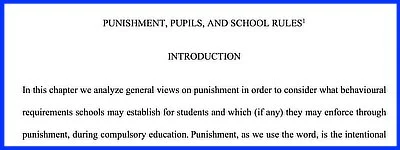Punishment, Pupils, And School Rules
By John Tillson and Winston C. Thompson.
In this chapter we analyze general views on punishment in order to consider what behavioural requirements schools may establish for students and which (if any) they may enforce through punishment, during compulsory education. Punishment, as we use the word, is the intentional imposition of burdensome treatment on someone – usually on the rule breaker – for having broken a rule, partly because the treatment is burdensome. By carefully analyzing various aspects of punishment, we aim to identify principles that should guide and constrain which behaviours schools punish, and how and why they punish them. In brief, we develop the following principles regarding legitimate requirements that can be made of students and the ways punishment may be used to enforce them. Before children are autonomous, schools may establish both paternalistic, and other-regarding requirements, but not requirements imposed from within comprehensive conceptions of the good. 2 They may punish children in order to ensure a fair distribution of the burdens and benefits of social arrangements. Schools may punish children for paternalistic reasons, including developmental reasons, but not for reasons of general deterrence. When children become autonomous, compulsory schooling may establish only other-regarding requirements of student conduct. 3 They may punish to ensure a fair distribution of the burdens or benefits of social arrangements; this includes punishing for reasons of general deterrence, due to children’s responsible choices enhancing their liability, as well as for other-regarding developmental reasons.
Pedagogies of Punishment: The Ethics of Discipline in Education.. Bloomsbury Academic. 2023. pp. 35-62


